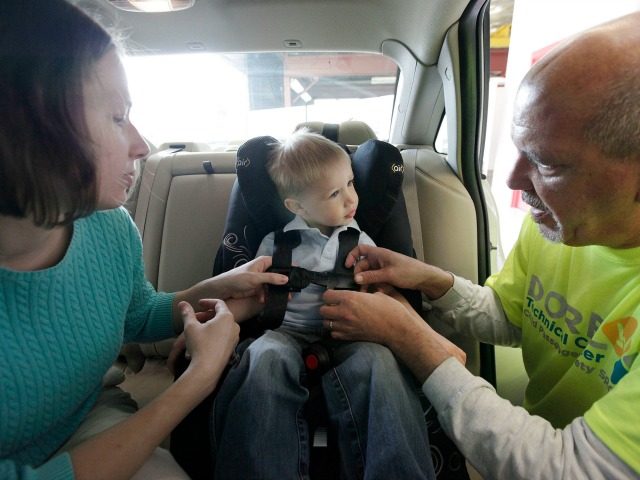As the temperature increases in the coming months across the country, incidents of children being trapped in hot cars is set to increase. More than 700 children died from heat exhaustion in cars in 1998; 12 have already lost their lives this year alone. The HOT CARS Act of 2017 would require cars to be fitted with a system that alerts the driver if a child is left in the back seat after the engine is switched off.
In 90 degree heat, the temperature inside a car can reach up to 133 degrees in only an hour, according to Jan Null, a climatologist and expert on vehicle heatstroke deaths. 54 percent of deaths were a result of parent forgetfulness, according to a database from Null. David Diamond, a professor of psychology at the University of South Florida, said at a press conference that the parents were not to blame, as their memory lapse was often triggered by lack of sleep, distraction or a change in routine:
These children were not forgotten by parents that were reckless with regard to care for their children… This phenomenon must be explained from a brain science perspective, not one that blames parents for being negligent.
Ryan introduced the “Helping Overcome Trauma for Children Alone in Rear Seats Act” on June 7th; the bill was co-sponsored by Peter T. King (R-N.Y.) and Jan Schakowsky (D-Ill). In an interview with the Capital Weather Gang, Ryan said that he wanted to help stop the majority of these deaths from occurring. “Anybody who has kids looks at this as a complete tragedy that doesn’t need to happen,” he said. “There’s no reason we can’t have a quick fix. Every year we wait we lose more and more lives.”
According to Ryan, the implementation cost would be “very, very small” for car manufacturers. “Consider the cost of not doing it. When you spread it across the industry, it’s de minimis,” he explained. He went on to note that he is hopeful that the bill will pass, and that supporting organizations are currently working on a Senate version. Ryan thinks that the bill would be “something the administration would support.”
The technology brought up by those in favor of the act is already commercially available. Four popular systems were tested by ABC News’ Paula Faris: Sensorsafe, a technology built into some carseats, which uses a smart chest clip to sense whether a child is still strapped in; General Motor’s built-in system that sends an alert as soon as the engine is turned off if the back doors were opened or closed within 10 minutes of the car being started; Driver’s Little Helper, another carseat system that sends a notification to an app 1 minute after the car is stopped; and finally Waze, a traffic app that reminds a driver to check their back seat when their destination is reached.
However, the technology is not completely infallible. The GM back door notification will not work if the car is stopped and restarted without the back door being opened, such as if the driver stops at a gas station part way through their journey. The reverse is true of Waze, in that an impromptu stop will not cause an alert to be sent.
Janette Fennell, the president and founder of KidsAndCars, told ABC News that parents should therefore use multiple layers of protection against incidents occurring, such as putting a bag in the back, or just making it a habit to always check the back seat whenever you get out the car. “The biggest mistake that parents make is they really feel this can’t ever happen to them,” Fennell said.
Null also highlighted that the bill would in no way be a “panacea” that would prevent all heatstroke deaths immediately. The majority of deaths do occur as a result of forgetfulness, but 46 percent are due to other reasons, including when children are purposefully left in the car (17 percent) or when children lock themselves in when playing and can’t get out (28 percent). Null estimates it will take 15 years before the majority of cars in the country will have the technology included in the bill. He stressed that education of parents need to be prioritized, saying that “parents and other caregivers need to be educated that a vehicle is not a babysitter or play area… but it can easily become tragedy.”
Jack Hadfield is a student at the University of Warwick and a regular contributor to Breitbart Tech. You can like his page on Facebook and follow him on Twitter @ToryBastard_ or on Gab @JH.

COMMENTS
Please let us know if you're having issues with commenting.